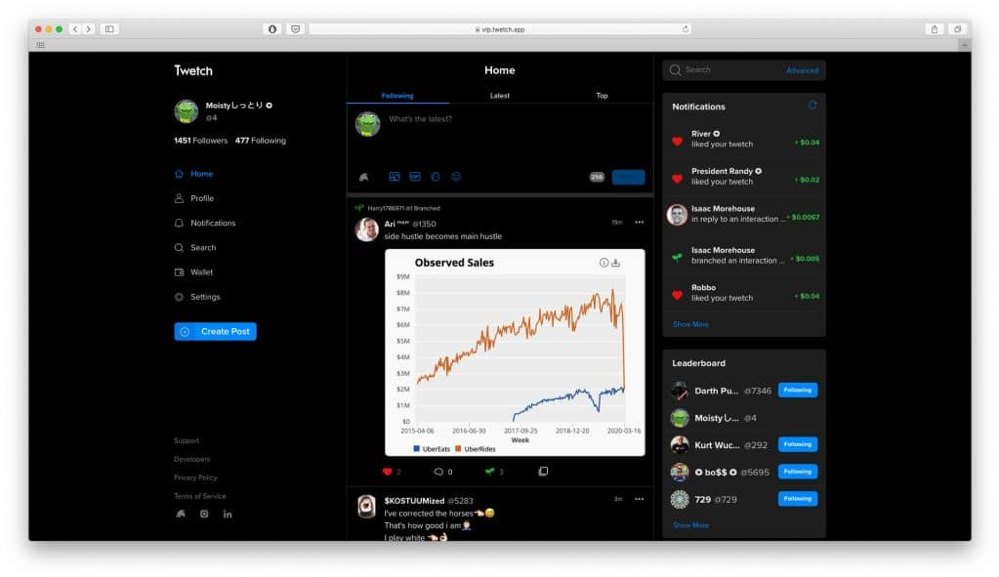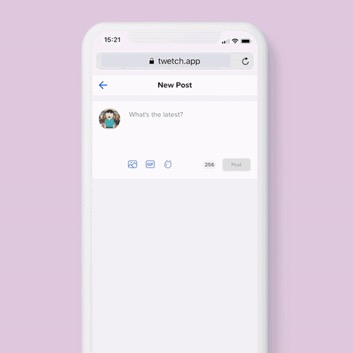Combining social savvy with the idea of an economically underpinned information marketplace, Twetch is a new take on the social media experience, powered by the BSV blockchain.
Twetch is a social media application built entirely on BSV, with all activities and interactions carried out directly on the blockchain.
‘All social media is wrecked,’ declares co-founder and CEO Josh Petty.
‘Whether it’s email, chat or using social networks, everything you do online is creating information. Social media companies are getting this data and they’re selling it in one way or another, and as a user, you don’t see anything in return. That’s exactly what we’re trying to address with Twetch.’
‘With Twetch, users own their data and have the ability to profit from their content,’ Petty explains.
‘In its current form, it feels a lot like Twitter. But when you post, it’s being posted to the BSV blockchain – the data is actually hosted there – so you can access and take that data with you.’
By hosting data on the BSV blockchain, Twetch ensures that its users’ content will remain forever accessible, regardless of the status of the service itself. This contrasts directly with mainstream social media companies, where data often disappears for various reasons – the company itself may shut down or users may be de-platformed. Twetch also gives users the ability to control their personal data flow, choosing their preferred balance between privacy and profit.
‘At Twetch, we think that people are willing to pay for privacy. The more people who start to realise that everything that they post on Instagram – any picture or photo – could be put up on a billboard by Instagram and the user would earn nothing for it, the more I think that people will come around to our way of thinking,’ says Twetch CMO and co-founder Billy Rose.
‘All of this valuable information is just given away for free, with only the platform profiting. I think that as people become increasingly accustomed to the idea of paying very small amounts for things that they do on the internet; it will open up opportunities for new online business models.’
Twetch relies and scales on a microtransaction network built on and enabled by the BSV blockchain, and it scales and helps to sustain the blockchain as it grows.
‘When somebody interacts with the information that you post, you’re earning. Using microtransactions, when you post something, it might cost you a penny or two to make that post. But, if somebody likes your post, or they share it or reply to it, they might pay a penny or two to make that interaction, so you’re earning back the pennies you paid to post that initial information,’ Petty says.
‘It’s a really simple information market, and the best way that is understood is through a simple interface – like Twitter or like any other social media platform – but it’s built on BSV.’
By building on the BSV blockchain, Petty and his team had the ability to natively intertwine information and payments into linked transactions, opening up the possibilities available for how to both fund and scale their product. The result, a platform where users literally vote with their wallets, has been quick to draw interest from content creators previously marginalised by other platforms.
‘We’re seeing a lot of interest from people who create on the internet – artists, designers, photographers and even some big actors and directors,’ says Petty.
‘These types of people joining the platform – firstly, I think they’ve very entrepreneurial and I like that they’re willing to experiment – but I think that they understand that they can’t monetize their followers and their audience directly.’
To date, more than 50,000 users have signed up for Twetch, with well-known users including actor Danny Trejo (@8279) and director Eli Roth (@1676).
Building social media on BSV
Petty and Rose had previously considered developing a social media platform built on the blockchain, but had been unable to find a platform that would support their vision.
‘We had the idea of building an application like Twitter on the blockchain for many years, but there was just no blockchain that was capable of scaling or doing the things that we needed it to do – in particular, micropayments,’ says Rose.
Through its use of microtransactions, Twetch provides digital currency holders with a way to spend and use their tokens outside of simply swapping them for others or converting them back into fiat currency.
‘Twetch offers people an outlet where they can use their digital currencies in their everyday lives. It might only be tiny amounts each time, but it shows that people are willing to pay for what they consume online, no matter how small,’ Rose says.
The platform uses this microtransaction model to incentivise the creation of high-quality content and discourage negative interactions or ‘trolling’. This type of solution is only possible with the BSV blockchain, as it features support for micro- and nano-payments natively without a second-layer network. BSV offers infinite scalability and a fully featured scripting language, making it the ideal choice for blockchain development.
‘With BSV it’s quite simple: it doesn’t have an artificial cap and there’s no goofing around with the code – it’s a base protocol and it’s simple – everything else on top of that can be built really complexly,’ says Petty.
‘There are creative people out there and they understand that there is a future that is going to be built on BSV and that it’s not going to stagnate, it won’t be restricted, there won’t be any artificial caps on this stopping us from growing and making really useful things on the blockchain.’
Petty adds that by deploying a social media platform to the BSV blockchain, Twetch empowers individual users more than any other social media application.
‘The most important thing though, is that it works. That is the most important thing of all, because we’ve broken blockchains before. So blockchains that don’t freeze up are very important to us!’ Petty says.
Petty points to the Twetch software development kit [SDK] as evidence of the extent of their commitment, both to the platform and the wider BSV ecosystem.
This SDK allows users and developers on Twetch to develop new tools for use on Twetch, including chatbots, post schedulers, or bots that play games against real users.
Twetch has also launched Twetch Arcade – a blockchain-based gaming service built into its social media platform which is seamlessly integrated with micropayments on the BSV blockchain.
Familiar interface and powerful functionality
Through its rapid growth and implementation, Twetch has demonstrated the potential of using the BSV blockchain to power applications which require true enterprise scale. As the volume of transactions continues to grow across the BSV network, Twetch stands to become an increasingly prominent contributor – with support and features quick to be rolled out across the platform as it targets swathes of new users.
Rose explains that Twetch was originally built to be a mobile-first application, but it has since grown across other platforms. It sports an interface that familiar to social media users and aims to remove any barriers to entry, showing how easy interacting with a blockchain-based application should be.

The look and feel of Twetch is familiar to anyone with experience using social media, with its easy-to-use interface being intentionally designed to facilitate a flat learning curve for new users to the platform.
‘On the right side of the app, we experimented a little bit more and tried some new things. We created a quick search and notifications panel, as well as a leader board that contains the top ten people on Twetch – one list of those who have earned the most and one for those who have spent the most,’ says Rose.
‘What we’re trying to do is experiment with different ideas around how to find new people to get active on Twetch, as well as the ways which we can successfully identify the best and most-active users on the platform. Part of this is through exploring ideas around competitions and incentive mechanisms in order to create further activity on the platform and generate more transactions on the network.’
In addition to Twetch Arcade, the platform has also released other powerful tools. These include ‘/Pay’ – a feature that integrates peer-to-peer transactions directly onto the platform and enables tipping.
‘/Pay enables anyone to send and receive payments directly on Twetch. It’s like a terminal command, where you put /Pay and then you tag the person you want to pay, enter the amount, and then it instantly sends peer-to-peer digital currency between users,’ explains Rose.
‘It’s like integrating Venmo or CashApp directly into Twitter – or in this case – Twetch. It uses BSV as the payment system, so whichever wallet you’re using is used directly to transact.’
As Twetch itself is built on the BSV blockchain, this removes the need for the integration of third-party payment processors and simply lets users send money to one another directly through the app.

At present, Twetch supports Money Button, DotWallet and RelayX, but is working on collaborating with other BSV wallets as part of an ambitious growth trajectory envisioned by its founders.
‘I hope that in 12 months’ time, we’ve continued to grow to the point where we have a platform that is capable of handling the needs of millions of users. I think that within 12 months’ time, too, we could have one million users active on Twetch,’ says Rose.
‘In order to do that, we have to build an application that can move at the speed of light and is capable of handling that amount of data. For us, it’s a matter of having the time and getting it all done. We have everybody here that we need on our team, we’re sold on the vision and willing to work hard for equity in the company.’
When it comes to taking on incumbent social media giants, Twetch is confident in its unique and powerful functionality, as well as the opportunity presented by the demand for a social media platform that gives users control over their own data and frees them from the control or censorship of private companies.
‘For us, I think it’s just taking everything step-by step, you have to take it all day-by-day and what we do is just try to keep building the best possible product that we can,’ says Rose.
‘I really do think that there is a huge hole in the market where a new entrant could come in and solve these issues: fix the de-platforming of users; allow content creators to earn; maybe even find a way to get rid of fake news. All of these things can be solved by us building an application on BSV.’
Further Use Cases Emerging
While Twetch remains the most prominent use case of social media harnessing the power of the BSV blockchain, it is far from the only one. With more than 400 projects being actively developed for BSV, a number are also targeting this area, with some exciting initiatives to watch out for.
Relica

Relica is another social media app being developed for the BSV blockchain. It was founded by Daniel Street and Jeremy Street and was first pitched in 2020.
Since then, it has evolved significantly and has seen impressive adoption as part of its beta programme.
The platform is an image-sharing social network that runs on BSV, sporting a similar UI and functionality to Instagram. The difference is that images shared on Relica are hashed and stored immutably on the BSV blockchain, empowering users with the same data sovereignty as services like Twetch.
BSV micropayments are integrated seamlessly into the service, incentivising the creation of quality content and allowing users to earn money directly from others based on their content.
Relica users also retain ownership of the content they create and they are free to express themselves freely without fear of being unnecessarily censored or de-platformed.
The application is now out of private beta and development is continuing to bring more features to the platform.
Users can sign up for the Relica beta by visiting https://www.relica.world.